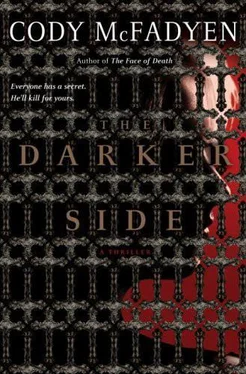I find all of this intriguing, even admirable, but high-profile people can become mythological fast if you let them. I want to get a sense of Rosario Reid for myself, because understanding the mother will help me understand the child. I need to figure out if and how much she's going to lie to me, and if she does lie, for what reasons. Love for her child? Political expedience? Just because?
MRS. REID NODS TO MEas I close my door. She knocks on the partition window for the driver to go and pushes a button that I surmise turns off the intercom. The car starts driving and we take a moment to appraise each other.
Rosario Reid is undeniably attractive. She has the classic lines of an intelligent Latin beauty; sophisticated, yet sensuous. As a woman, I can tell she's taken measures to tone this beauty down. Her hair is short and all business, and she's allowed strands of gray to remain untouched. There's no mascara thickening her lashes. Her son got his full lips from her, but she's used liner to make less of the cupid's bow. She's wearing a simple white blouse, a navy jacket, and matching navy slacks, all tailored to perfection but sexually muted. These superficial things highlight her political savvy and tell me a lot about her loyalty to her husband. Rosario is doing the opposite of what most women do. She's playing down her native sensuality, leavening her beauty with understated professionalism. Tweed, not silk. Why? So that she remains palatable to the congressman's female constituency. Powerful women can be attractive, but never sensuous or sexy. I don't know why this is so, but it is, even for me. I trust a woman in a position of power who looks like Rosario more than I would one who looks like a Victoria's Secret model. Go figure.
She's strong too. She's keeping herself composed, but the intensity of her grief is obvious when I look into her eyes. She won't weep in public. Grief is private to this woman, another thing we share in addition to our dead children.
She breaks the silence first. "Thank you for coming, Agent Barrett." Her voice is measured, quiet, neither low nor high. "I know this is unusual. I've made a point, over the years, of not using my family's political position for personal favors." She shrugs, and her grief gives it a terrible elegance. "My child is dead. I made an exception."
"I'd do the same in your position, Mrs. Reid. I'm very sorry for your loss. I know that's a cliched thing to say and I know it's inadequate under the circumstances, but I am sorry. Dexter-" I stop, frown. "I'm not familiar with the etiquette here, ma'am. Should I say
'him' or 'her'? Should I use Dexter or Lisa?"
"Lisa spent her life wanting to become a woman. The least we can do is treat her like one now that she's dead."
"Yes, ma'am."
"Let's do away with the titles in private, shall we, Smoky? We're just two mothers of dead children here. No men around with their peacock worries or chest-puffing." She pauses, fixes me with a fierce gaze. "We need to put our heads together and do some dirty work, and that requires first names and no pleasantries, don't you agree?"
We women, we're the ones who bury the children, the ones who drag the hems of our dresses through the cemetery dirt, that's what she's saying.
"Okay, Rosario."
"Good." I see her eyes appraising my scars. "I read about what you went through. In the papers and so on. I've been an admirer of yours for years."
Her gaze remains level as she says these words to me. Her eyes don't flinch at the scars on my face, not even a little. If she's at all uncomfortable, she hides it better than the Director did. I've inclined my head to Rosario in acknowledgment.
"Thank you, but there's nothing all that admirable about being the one who wasn't killed."
She frowns. "That's very uncharitable. You went on. You continued to do the job that put you in harm's way. You continue to do that job well. You continue to live in the house where it happened-which I understand, by the way. I'm sure many don't, but I do." She smiles a sad smile. "Your home is your tree, the place where your roots are buried. It's where your daughter was born, and that memory is more powerful than all the painful ones, yes?"
"That's right," I reply, quiet.
I find myself taken by this woman. I like her. She is honest. Her insightfulness speaks to her character. This is someone who understands: family is home, family is the roof against the world. Love may be the glue, but the string of moments shared, that's the soul of things.
We're driving at a leisurely pace, a big circle with the morgue at its center. My eyes are drawn to the turning leaves again; it's as if the trees are on fire.
"Like you," Rosario says, continuing to look out the window, "I married the man I kissed in high school. Have you seen pictures of my Dillon?"
"Yes. He's handsome."
"He was then too. And so young. He was my first love." She gives me a sideways glance, a small grin. It makes her seem eighteen for a moment, a brief, bright flash. "My first everything."
I smile back. "Matt was for me too."
"We're a dying breed, Smoky. Women who marry their high school sweethearts, who can count their lovers on just a few fingers. Do you think we're better off, or worse?"
I shrug. "I think happiness is the most personal thing there is. I didn't marry Matt to make a statement about chastity or anything. I married him because I loved him."
Something about what I just said shakes that composure, a little. Her eyes get wet, though tears don't fall.
"What an excellent way to put it. Yes. Happiness is a personal thing. That was certainly true for my daughter." She turns in the car seat so that she is facing me. "Did you know that it's more dangerous to be a transgendered person than any other discriminated minority?
You're more likely to be a victim of a violent hate crime than a gay or a Muslim, a Jew or an African-American."
"Yes, I did know."
"And they are aware of this, Smoky. The boys and men who become women, the girls and women who become men-they know they're going to be shunned and reviled, maybe beaten, maybe even killed. Still, they do it. Do you know why?" Her hands shake and she grips them in her lap. "They do it because there's no other way for them to be happy."
"Tell me about Lisa," I prod her.
Because that's what she really wants to do. That's why I'm here. She wants to make me see Lisa, to care for her. She wants me to understand what's been lost, and to feel it.
She closes her eyes for a moment. When she opens them, I can see the love. This is a strong woman, and she'd loved her child with all of that strength.
"I'll use the name Dexter first, because that's how he started. Dexter was a kind, beautiful boy. I know all parents think their children walk on water, but Dexter really did not have a mean bone in his body. He was small and slight, but never weak. Gentle, but not naive. You understand?"
"Yes."
"I suppose the stereotype would have him as a momma's boy, and that was true to a degree, but he didn't hide behind my skirts. He spent his time like any boy-outside, in the sun, getting into various types of trouble. He played in Little League, started learning the guitar when he was ten, got into a fight or two with bullies. No reason to think or assume he was going to do anything other than grow up to be a wonderful man. I rarely had to use his first, middle, and last name at the same time."
She assumes I know what she means, and she's right. It's universal mother-speak. Every child knows, when Mom uses your first and last name together, you're in trouble. First, middle, and last? That particular triumvirate is reserved for the worst offenses, the greatest angers. Duck, cover, and hold.
She looks at me. "How old was your daughter when she died?"
Читать дальше












